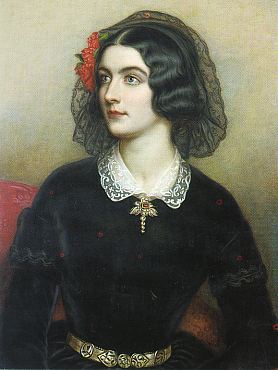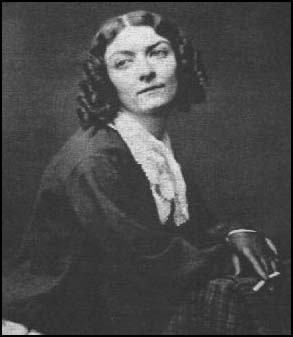When I first started my Lola studies, I was very curious to see what she looked like, and this was the painted portrait I kept coming across in books:

Wow, what an elegant beauty, I thought. Lola herself wrote a book, The Arts of Beauty, and chapter seven was devoted to "A Beautiful Face."
"If it be true that the face is the index of the mind," she said, "the recipe for a beautiful face must be something that reaches the soul. What can be done for a human face that has a sluggish, sullen, arrogant, angry mind looking out at every feature? An habitually ill-natured, discontented mind ploughs the face with inevitable marks of its own vice....If a woman's soul is without cultivation, without taste, without refinement, without the sweetness of a happy mind, not all the mysteries of art can ever make her face beautiful."
Oh dear. Need I remind you that Lola died alone of syphilis in the poorhouse when she was 43, having lived on four continents and gone through scores of husbands and lovers? Lola knew from discontent and vice. On first reading, her thoughts about a beautiful face come across as the prim lecturing of a Victorian lady. On second reading, knowing what we know about Lola's fate, her words are a desperate plea, the negative morality of a woman who fought the world every day of her life.
And then one day, I came across a biography that provided the first photographic evidence of what she truly looked like:

My heart skipped a beat. Oh my god, Lola Montez smoked! Her face was hard, with a mouth narrow and set, eyes hooded with contempt. She looked like a tough girl who would beat me up after school. Lola scared me. Was she a bad girl? Oh, I think so.
Ever since I've seen Lola's photo, I've tried my best to love her. But it isn't easy. She's not my favorite bad girl. I get the feeling that if I tried to put my arms around her to give her a hug, she would flinch and push me away, glaring at me with arrogance and anger and just itching for a fight.

2 comments:
Out of curiosity....how many of your bad girls were Mothers??
x
Oh, good question, Anonymous! The answer is: very few.
Bessie Smith and Mae West, for examsple, never had babies, and we don't know why. (Bessie adopted a son later in life.) But they lived in the 20th century, so birth control was available. So were abortions. In the 19th century, Lola Montez was never a mother, nor was Skittles, nor Isabelle Eberhardt--and these were very promiscuous women! I don't know how they avoided pregnancy--though Isabelle was a drug-addicted anorexic who may have preferred anal intercourse, according to one of her biographers, so that might explain how she never became a mother.
The bad girls who did become mothers were usually bad mothers. Catherine the Great had about a dozen babies, but she'd just drop them off in the royal court's nursery and wouldn't see them again until she met them as adults at dinner parties (just kidding). Young children really didn't interest Catherine, and her many children were bastards and thus not of royal blood, so they weren't much use to her.
I'm meandering again. But here's a personal note, which I might as well mention here: at the time I started to study bad girls, I was 41 years old, had miscarried about a year earlier, and was extremely sad and struggling with the idea that I was highly unlikely to ever have children from my womb. It comforted me to find these women who also weren't mothers and didn't seem to be troubled by it at all. In fact, they seemed to embrace childlessness.
Post a Comment